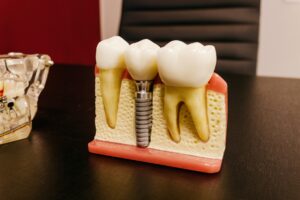 If you’re ready to treat your missing teeth permanently, dental implants are the solution for you. A dental implant is unique because it replaces both the tooth root and the crown. You’ll enjoy results that look and feel natural using a method that has over a 95% success rate. However, you’re going to need to take a couple of days off from work. Here’s how soon you can head back to the office after your placement surgery.
If you’re ready to treat your missing teeth permanently, dental implants are the solution for you. A dental implant is unique because it replaces both the tooth root and the crown. You’ll enjoy results that look and feel natural using a method that has over a 95% success rate. However, you’re going to need to take a couple of days off from work. Here’s how soon you can head back to the office after your placement surgery.
Process of Getting Dental Implants
The process of replacing a tooth with a dental implant occurs in several steps, which can take many months. After recovering from any preparatory procedures, like bone grafting or gum disease therapy, you will be scheduled for your placement surgery. Sedation or anesthesia will be used to keep you comfortable as your dentist surgically places an implant post into your bone to serve as a new root.
It will take many weeks for your bone to integrate with the post through a process called osseointegration. After your bone has healed, you’ll require a second minor procedure to attach an abutment to the post, which is needed to connect your restoration to your implant.
Recovering from Dental Implant Surgery
Sedation or anesthesia will be used during your placement surgery, so you’ll need someone to drive you home from your appointment. It can take a few hours for the medications to wear off. You’ll need to rest for about 24 hours to allow the effects to fully dissipate. Here’s what you can expect during the next couple of weeks after your surgery:
- Pain Management: Take prescribed or OTC pain relievers to manage your discomfort. It should improve within 3-5 days. Apply a cold compress to reduce pain, inflammation, and bruising.
- Diet Restrictions: Follow your dentist’s dietary instructions, like consuming liquids for the first week or two. Don’t drink anything carbonated or containing alcohol.
- Returning to Work: You can return to work in 24-48 hours. However, if your job is physically strenuous, your dentist may recommend modifying your work-related tasks.
- Resuming Exercise: It’s best to avoid exercising for at least 1 week because it can increase your risk of bleeding.
Everyone heals differently, and many factors can influence the process, like underlying medical conditions. Your dentist will review your aftercare instructions, including when you can return to work. Follow their instructions to avoid any healing delays.
About Dr. Robert A. Whitmore
Dr. Whitmore achieved his dental degree at Baylor College of Dentistry and has continued his education to provide the most up-to-date solutions in dentistry, including dental implants. He is also a member of Dental Health Arlington, a non-profit organization. Request an appointment through his website or call his office at (817) 383-8833.
